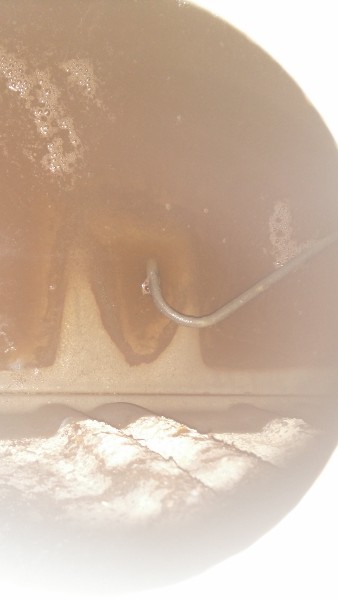 |
 |
 |
 |

|


|
|
|
|
|
|
#1
|
|||
|
|||
|
cleaning up rust in petrol tank
|
|
#2
|
|||
|
|||
|
Is taking it to a radiator shop an option in your area to get it professionally cleaned?
If the rust is scaly, I've heard of putting a small amount of sharp/pointed gravel in tanks and moving/shaking the tank around alot (sounds tiring). Only do this if it would be easy to get the gravel completely removed. Vinegar? EvapoRust? Pressure wash? Definitely worth a try. Good luck!!!
__________________
"Rudeness is a weak man's imitation of strength" - Eric Hoffer |
|
#3
|
|||
|
|||
|
The local radiator shop overcharges that's the reason I ask for a DIY. It has been filled with a gallon of Vinegar now will agitate around once a while.
|
|
#4
|
|||
|
|||
|
The tank has ''six sides'' will let the vinegar sit one side a day. I just have the vinegar just an hour in and its getting rust loose:
 Another question is could I blow in hot air with a heatgun to make the process quicker? Its a dry tank with no fuel in it. Last edited by jsp300D; 12-03-2018 at 03:03 AM. |
|
#5
|
||||
|
||||
|
POR15 make a tank sealer and cleaner kit in one - I've never used it before though so I can't really recommend.
__________________
1992 W201 190E 1.8 171,000 km - Daily driver 1981 W123 300D ~ 100,000 miles / 160,000 km - project car stripped to the bone 1965 Land Rover Series 2a Station Wagon CIS recovery therapy! 1961 Volvo PV544 Bare metal rat rod-ish thing I'm here to chat about cars and to help others - I'm not here "to always be right" like an internet warrior Don't leave that there - I'll take it to bits! |
|
#6
|
|||
|
|||
|
If there is a urethane lining kit out there may be your best bet. I was wondering if it was just dried out gas residue. I cannot really see the tank to tell. I might depending flush the vinegar out and try some laquer thinner. If it really changes color it is not rust. Laquer thinner has no effect on rust.
|
|
#7
|
|||
|
|||
|
This tank had sit like 10 years with 1/8 fuel. Rust has been formed. Almost rust loosened now.
|
|
#8
|
|||
|
|||
|
It probably isn't rust, it is likely varnish from old fuel.
Try denatured alcohol / lacquer thinner. |
|
#9
|
|||
|
|||
|
Its rust though.
|
|
#10
|
||||
|
||||
|
rust
Oxalic acid, water, log chain
__________________
|
|
#11
|
|||
|
|||
|
#12
|
||||
|
||||
|
If you scrape the sides I bet you get to find fresh rust.
You are better off using Evaporust or Rustyco if you can afford it - seriously expensive stuff however. In the Land Rover world they rave on about electrolysis as a rust removing process - I've not tried it myself yet...
__________________
1992 W201 190E 1.8 171,000 km - Daily driver 1981 W123 300D ~ 100,000 miles / 160,000 km - project car stripped to the bone 1965 Land Rover Series 2a Station Wagon CIS recovery therapy! 1961 Volvo PV544 Bare metal rat rod-ish thing I'm here to chat about cars and to help others - I'm not here "to always be right" like an internet warrior Don't leave that there - I'll take it to bits! |
|
#13
|
|||
|
|||
|
Quote:
A lot of the old tractor guys do this, it works. However, the parts need to be baked to drive out hydrogen otherwise you get embrittlement. |
|
#14
|
||||
|
||||
|
Quote:
The Land Rover lot (so to speak) don't mention baking at gas mark 4 afterwards - and don't seem to mention cracking... ...probably because cracking Birmabright is considered to be normal on a Land Rover so why would they worry about the steel too (!)... ...I wonder how many of them consider this at all. I'm guessing not many - if any. From now on I shall forewarn.
__________________
1992 W201 190E 1.8 171,000 km - Daily driver 1981 W123 300D ~ 100,000 miles / 160,000 km - project car stripped to the bone 1965 Land Rover Series 2a Station Wagon CIS recovery therapy! 1961 Volvo PV544 Bare metal rat rod-ish thing I'm here to chat about cars and to help others - I'm not here "to always be right" like an internet warrior Don't leave that there - I'll take it to bits! |
|
#15
|
|||
|
|||
|
Quote:
Let's wait and see |
 |
| Bookmarks |
|
|